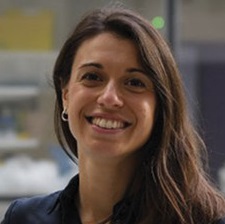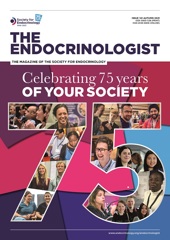Throughout the Society’s history, the rapid development of our discipline has driven the growth of endocrine education and training. Indeed, the advancement of scientific and clinical education is at the forefront of the Society’s objectives. We asked contributors to reflect on significant recent steps supporting the development of endocrinologists today.
FROM PhD TO FELLOWSHIP: CREATING A NICHE
Ever since I was a PhD student at the Institute of Reproductive and Developmental Biology, Imperial College London, it was clear that a certain financial independence was necessary to pursue my scientific interests. Indeed, when I got the four-year President’s PhD scholarship, I had already accumulated research experience abroad, thanks to two different scholarships awarded by ‘Sapienza’ University of Rome and the University of Bari ‘Aldo Moro’.
Throughout my PhD, I was extremely lucky to work with supportive colleagues, attend several international conferences and collaborate with various research groups. Moreover, my principal investigator gave me the scientific freedom to propose and test my own research ideas. This was essential to develop trust in myself as a scientist and to start conceiving my own research projects.
When approaching the end of my PhD, I began thinking about the path to independence as a principal investigator and applied for my first ever grant: the Society for Endocrinology Early Career Grant, which is a great way to start applying for your own funds. I found both the application and the review process straightforward. This is helpful when dealing with this kind of application for the first time and/or being in the final months of your PhD, busy with thesis writing, paper revision and job interviews.
My principal investigator gave me the scientific freedom to propose and test my own research ideas. This was essential to develop trust in myself as a scientist and to start conceiving my own research projects.
Getting this grant was a milestone in my career, as it provided me with the financial means to pursue my research interests and publish other research articles. Most importantly, it allowed me to acquire the experience in grant writing that was fundamental to what I consider the biggest achievement of my academic career: being awarded a Sir Henry Wellcome Postdoctoral Fellowship in 2019.
This award was the fruit of a combination of my interest in G protein-coupled receptor (GPCR) biology (which I developed from my Bachelor’s degree and throughout my PhD) with new ideas and insights arising after joining the Interdisciplinary Institute for Neuroscience in Bordeaux for my postdoc in 2018. Indeed, even though my research has always focused on the mechanisms regulating GPCR function, I have continuously tried to expand my expertise by working on different models, techniques and physiological contexts. My aim was to find an area not much explored (or too neglected!), where I could start investigating and answer my first scientific questions.
The journey to get to my fellowship was not easy. I had to apply twice before I was successful: the application process was long (preliminary and full application, then interview), it required time and thorough preparation. However, the experience gained through previous applications, as well as the support from my hosting laboratories, patience, motivation and, above all, trust in myself and in my research project, helped make it feasible.
Create your own path, seek challenges that contribute to building that path and make you stronger in the process, make your own decisions and ask for help from people who have already been through the same challenges and can support you.
If you are planning to find or, better still, carve your own research niche, do not just wait for the head of your lab to propose an extension to your contract. Instead, create your own path, seek challenges that contribute to building that path and make you stronger in the process, make your own decisions and ask for help from people who have already been through the same challenges and can support you.
SILVIA SPOSINI
Sir Henry Wellcome Postodoctoral Fellow, Institute of Reproductive and Developmental Biology, Imperial College London, and CNRS, Interdisciplinary Institute for Neuroscience, University of Bordeaux, France
Read the other articles in this issue on the evolution of education and training in endocrinology:
TRANSFORMING TEACHING IN HIGHER EDUCATION
EDUCATION AND TRAINING OPPORTUNITIES FOR NURSES
THE NEW CURRICULUM IN ENDOCRINOLOGY AND DIABETES






